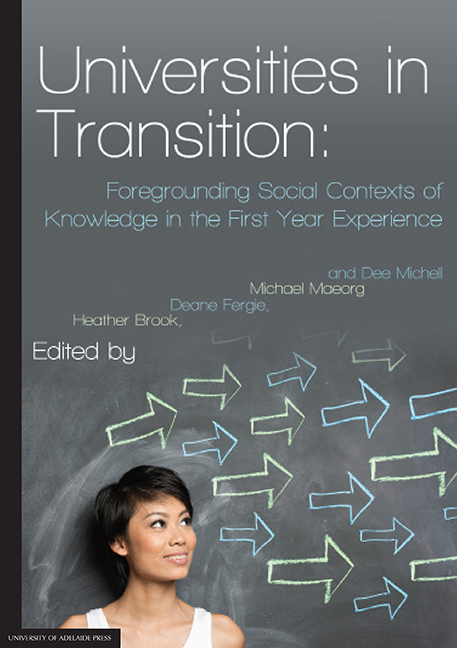Book contents
- Frontmatter
- Contents
- Notes on Contributors
- Introduction
- Part 1 Reconceptualising: transition and universities
- Part 2 Revaluing: ‘non-traditional’ student groups in higher education
- 3 Classism on campus? Exploring and extending understandings of social class in the contemporary higher education debate
- 4 Reframing ‘the problem’: students from low socio-economic status backgrounds transitioning to university
- 5 Changing social relations in higher education: the first-year international student and the ‘Chinese learner’ in Australia
- 6 Relating experiences: Regional and Remote students in their first year at university
- Part 3 Realising: transformations on campus
6 - Relating experiences: Regional and Remote students in their first year at university
from Part 2 - Revaluing: ‘non-traditional’ student groups in higher education
Published online by Cambridge University Press: 05 December 2014
- Frontmatter
- Contents
- Notes on Contributors
- Introduction
- Part 1 Reconceptualising: transition and universities
- Part 2 Revaluing: ‘non-traditional’ student groups in higher education
- 3 Classism on campus? Exploring and extending understandings of social class in the contemporary higher education debate
- 4 Reframing ‘the problem’: students from low socio-economic status backgrounds transitioning to university
- 5 Changing social relations in higher education: the first-year international student and the ‘Chinese learner’ in Australia
- 6 Relating experiences: Regional and Remote students in their first year at university
- Part 3 Realising: transformations on campus
Summary
Abstract
Developing positive relations with peers at university has long been recognised as a key to academic success for transitioning students. This chapter explores this issue from the perspective of Regional and Remote students in their first year at the University of Adelaide, through their experiences as related by them. While it might appear self-evident that these students would be particularly disadvantaged and ‘deficient’, relative to their urban peers, in terms of peer engagement and social integration, this chapter adopts a student-centred view of transition as ‘becoming’, and a ‘strengths’-based focus, to demonstrate how students problematise such normative assumptions. Through their experiential narratives and commentaries, the students not only affirm their own competency and agency but also point to challenges faced by city school leavers in navigating the increasing diversity of peer social domains.
Introduction
Many studies have highlighted the importance of social integration and the development of positive relations and networks amongst peers as a key to academic success at — and, in particular, in the critical transition to — university. As James, Krause and Jennings (2010: 43) have reminded us:
[t]he quality of students' engagement with peers in the university learning environment is a strong predictor of student persistence and retention. Peers play an important role in both social and academic integration in the first year.
- Type
- Chapter
- Information
- Universities in TransitionForegrounding Social Contexts of Knowledge in the First Year Experience, pp. 157 - 184Publisher: The University of Adelaide PressPrint publication year: 2014

